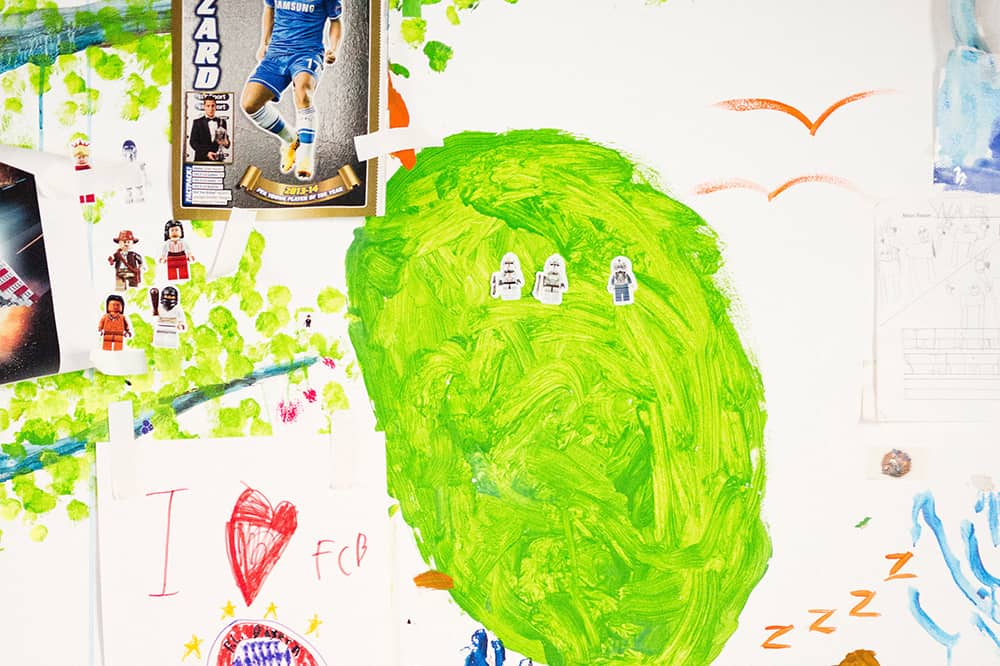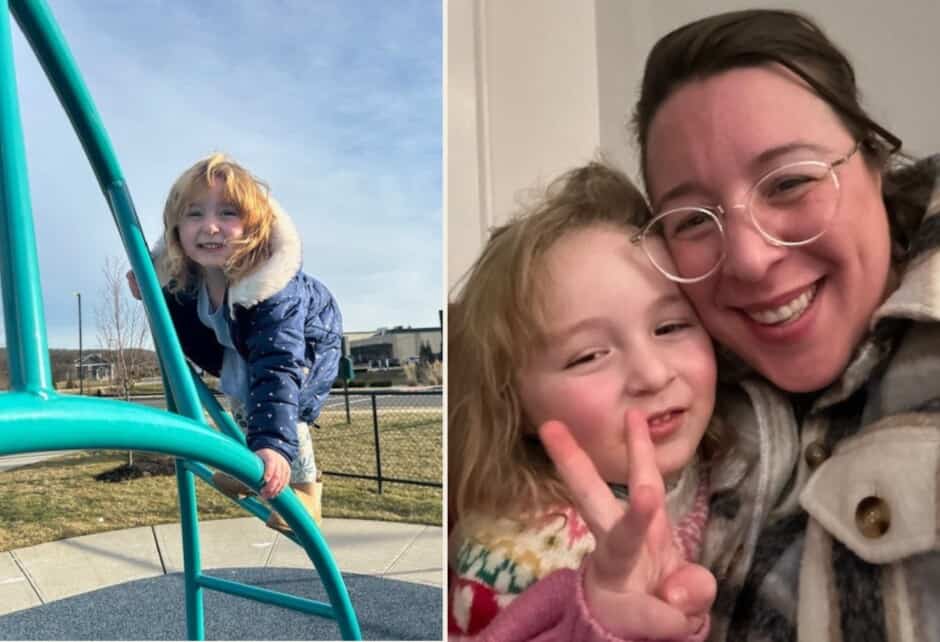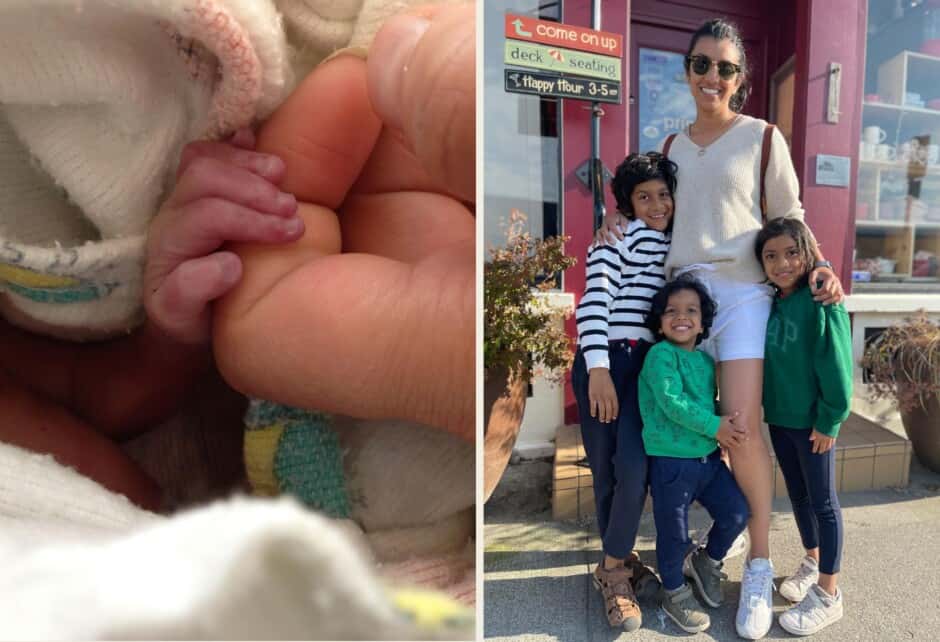
Mom Talk: The Day I Found Out My Son Had Cancer
Written by Lise Marzouk
Photography by PHOTOGRAPHED by Nicki Sebastian
As her ten-year-old son Solal sits at the kitchen table one evening, Lise Marzouk inspects his mouth and discovers an unusual growth. Doctors soon confirm the lump is cancerous, and in an instant, their lives are radically changed. Marzouk, the author of multiple French fiction titles, ended up writing about that year that changed their lives, and her new book, If: A Mother’s Memoir, offers up an insightful account of the daily realities of illness and of how we support ourselves and others through its ravages. In today’s Mom Talk, she shares her raw and honest account of the very first 24 hours when cancer entered their lives.
You’re sitting on a rush-seat chair in the kitchen. You just turned ten. You have your mouth wide open and I’m exploring it.
The thing’s abnormally large, I can see that. An incongruous, deformed irregular ball. It’s taking up half the space, masking its twin in the background, pushing aside your uvula in the middle. What I’m really worried about are the black threads. They wriggle into the folds, like fuliginous rivulets streaming through valleys of pink flesh. Black is not physiological. My first fleeting thoughts and words. For now, these words play on a loop inside my skull. I can’t break away from them. They cling to my mind just as these dark deposits cling to your tonsil. Viscous, cloying, repulsive. Black is not physiological. A stupid euphemism intended to postpone the terrible truth, which has already insinuated itself into me. And I know the facts: black flesh is decomposing flesh. The fetid breath you’ve been exhaling the last few days would be enough to convince me. We’ve laughed about that plenty. I’m not laughing now. I’m in no doubt: what I’m looking at is putrefying, with the color and smell of death.
Rational thinking comes trooping in like a detachment of guards. Or rather a militia. It forbids all prevarication, prescribes action, directing me to an internet page all about black throats, to find an acceptable answer. Not harmless but not unbearable. I scan quickly through the page, from one pathology to another. “Necrotic tonsillitis.” Perfect. I’ve found my solution. The tonsil is dying. You, on the other hand, are fine. A quick excision and it will all be over. The rational dictatorship conjures up its guillotine. Elimination with no damage to the guilty party. Clack. Off to the clinic, clean job, no mess. In making this choice, the dictatorship rejected a long list of minor ills—short-lived infections and other consequences of poor hygiene—set out on the first half of the page, and thereby conceded a fragment of terrain to my premonition of horror. Peace of mind definitely warrants sacrificing one tiny organ. Because on the altar of this still-bleeding tonsil, to the benefit of this same offering, peace of mind managed to ignore the last lines on that page, although it glimpsed them, just enough to grasp their terrifying relevance. The enemy is in fact already there, skulking at the back of the platoon, and—behind its paradoxically sweet, resonant name—it trails a cortege of indescribable fears and sorrows, and tries to lure my mind into its vertiginous dance. I refuse to pronounce its name. Back to the middle of the page. “Necrotic tonsillitis.”
Then come the decisions. It’s midnight, you’re tired, you’re in your pajamas and ready to go back to bed. The painkiller has done its work, your throat doesn’t hurt so much. The doctor on call will do. Better to avoid going to the hospital this evening. I call. Forty-five minutes elapse. You’ve gone back to sleep. The doctor shows up. Getting paunchy, shirt of dubious cleanliness, shapeless jacket, corduroy pants, worn leather briefcase. A few despicable social observations occur to me: Poor taste jokes about the sartorial and salary-related similarities between this night-duty GP and my fellow lecturers; an inadmissible contempt, distantly inherited from my family, for a man who most likely failed his residency thirty years ago, condemning himself to this job as an itinerant owl to top up his rather inglorious pay; and then a purely artistic interest in the varied prism around the contours of his eyes, the multicolored bags of a nocturnal rep for public health. Still, his homely appearance immediately gives me confidence. This is not the man to take us on down that internet page. We can rest easy. I can tell he’s an expert in the flu, upset stomachs, measles and other seasonal or childhood ailments. It only remains for me to coax him onto my terrain. Might as well come right out with it: “I think my son has necrotic tonsillitis. Well, you tell me, you know better than I do. One of his tonsils, but only one of them, is swollen and dark purple, almost black.” Then it’s repeat kitchen, repeat wide open mouth, repeat flashlight, repeat teaspoon on tongue, repeat tonsil. “When will you ever stop opening your mouth?” I tease you with a smile. Oh my, aren’t we having fun. We await the verdict, dimly anxious. “Ah yes, those black lines are strange”—you think so too, right—“it looks like tonsillitis but without the white spots”—there, now we’re getting somewhere, that’s reassuring—“it must be necrotic tonsillitis, it’s nothing to worry about”—we did it. End of Act I.
Act II. But now, seriously, what should I do? Because I did read those lines at the bottom of the internet page. And I wouldn’t want my delightful collaborator, devoted though he is to continued friendship between our respective corporations, to cause my son to run any risks. The ever dependable rational militia sends me reinforcements. It has a secret weapon which means I can advance under cover. “Will he definitely need surgery? Because, you see, we’re flying to Morocco in six days. Will he be fit to travel by next Saturday?” The journey angle is both real and irrefutable. Nothing quite like a deadline to get the wolf across the river. Handled correctly, the goat and the cabbage should also make the crossing unharmed. But Homely is an expert with more than one trick up his sleeve. And he categorically refuses to cross the Rubicon, let alone the Styx, with my whole menagerie. “Listen, we can’t be sure, it might not need surgery at all. The best thing would be to go see an ENT specialist in town in two or three days to see how it’s developing. Then you’ll know where you stand for Morocco.” Now, that I was not expecting. Back to the starting blocks. Unless…
I try a different tack. Tough luck for rational thinking and its troops. I open the door to the unexpected, just a fraction. I know for sure the conniving bastard, the enemy masked behind its honeyed little name will put its foot in there. If not a whole foot, at least the toes, a hint of it, the fear of it and the nagging thought of the possibility of it. But hey, we have to make the most of what’s available. After all, this really matters, this is about my son. We can’t always guarantee our own mental comfort. “You know, we nearly took him to the emergency room at Necker this evening, but then we thought that was over the top, maybe not necessary, maybe not the right thing.” Homely doesn’t see the trap. He falls into it like a greenhorn. “You know, they have a specialist ENT emergency department at Necker.” No, I didn’t know that, thanks. I do now. I also know the black river has just claimed its first victim.
I’m slightly reassured when we get to the emergency room. At first. It has the advantage of instantly drowning our isolation in a hubbub of cries, coughs, expectorations, and other excretions. We’re no longer alone, that’s for sure. Besides, the charming young man on reception told us with great aplomb that the visible black threads in your throat must be deposits of blood, residues of a harmless infection. The fact he hadn’t examined the tonsil and had absolutely no competence to evaluate it doesn’t matter much: we’re not going to deny ourselves a few extra minutes of immunity. Cocooned in our illusory confidence, we’re now eyeing the snotty specimens around us with all the arrogance of monarchs spared by common afflictions. Still, it’s only a brief respite, too brief not to be suspect. A doctor calls us. He is short, dark-haired, overworked-looking. He puts us in a cubicle. “Doctor G…,” he announces—an inarticulate and incomprehensible name—“don’t move, I’ll be back.” A pause. And off we go again: the unexplained tiredness, the abnormal tonsil, the smelly deposits, the inconclusive duty doctor, the hopes for Morocco. Here you are again, sitting with your mouth open and your tonsil laid bare. The thing’s grown so huge that you struggle to widen your jaws.
The vestiges of fresh, pink healthy flesh have now almost completely disappeared under the magma of purplish black, like a sea urchin’s orangey gonads buried in the fetid scramble of its digestive, circulatory, and nervous systems. Dr. G stands up and takes a moment. I swear he’s paled. Nothing else is said, but this pallor, coupled with the momentary hiatus, speaks volumes. It nudges my vigilance to maximum alert. I didn’t get his name, but I know Dr. G’s every breath, every look, every move, every emotion. First a change of pace. After the suspense, now the race. A sudden about-turn, a nervy, active quickening step, jerking movements, halting breath. A new rhythm, soon hammered out loudly as a leitmotif—“okay, no time to lose”—whose convulsive, almost spasming repetition strains the whole room, makes the air unbreathable, sucks out all the oxygen, as if the ER’s heart were accelerating furiously, signaling an imminent cardiac arrest. Hardly surprising then, in the circumstances, that Dr. G goes for reinforcements. He hurries back accompanied by an intern. And now the two of them come to a standstill a couple of yards from us, and they hover there, frozen, looking at each other, solemn-faced, heads tilted, contemplative as the peasants in Millet’s Angelus. Except that they’re not praying to some all-merciful God, but quietly exchanging a few unspeakable words. No, this definitely isn’t The Angelus. In this little booth, on this particular morning, it’s much more like a death knell that’s sounding, in secret, for me alone. Because, inaudible though it may be, I hear what Dr. G whispers in his coworker’s ear. Not all of it, not in detail, but enough. Just two words, in fact. But not any old words. And now I know. I don’t believe it, but I know. Stage two.
Are you a mother with something to say? Send us an email to be considered for our “Mom Talk” column.
Share this story



